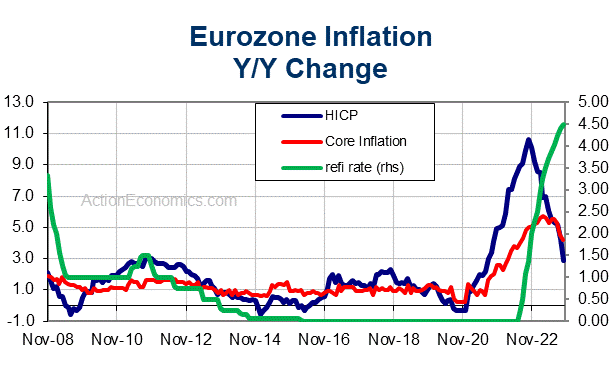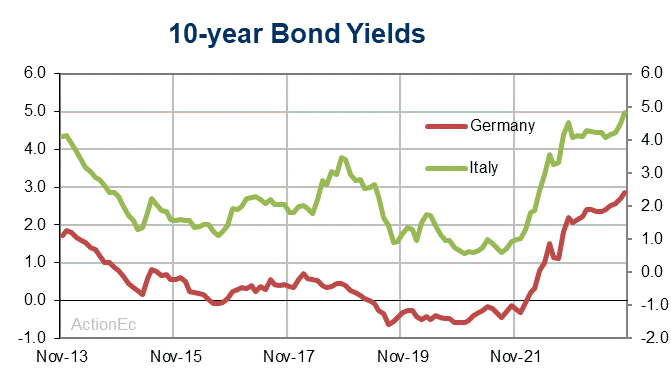Eurozone Stagflation Does Not Shift ECB Stance
With inflation coming down and growth indicators flashing recession risks, ECB officials are walking a fine line between trying to keep rate cut expectations under control and dampening fears that restrictive policies will hurt the labour market and overall growth. Under the ECB’s mandate, fighting inflation has priority, however, and that means economic weakness alone

With inflation coming down and growth indicators flashing recession risks, ECB officials are walking a fine line between trying to keep rate cut expectations under control and dampening fears that restrictive policies will hurt the labour market and overall growth.
Under the ECB’s mandate, fighting inflation has priority, however, and that means economic weakness alone won’t prompt the central bank to drop the implicit tightening bias.

Central bank officials have been out in force this week, with comments mostly attempting to play down the chances of early rate cuts.
GDP – November 14
The second reading of Q3 GDP numbers, on November 14, is widely expected to confirm that activity contracted -0.1% q/q through the June-September period. Confidence indicators are flagging further weakness through the last quarter of the year, with the chance of a mild technical recession looking quite high as PMIs remain firmly stuck in contraction territory.
Inflation – November 17
At the same time, final inflation readings for October, due next week, are expected to confirm the headline rate at 2.9%. This would mark a sharp fall from the 4.3% y/y rate for September, and indeed it would be the lowest reading since July of 2021. Given that the ECB’s previous rate hikes are still feeding through the system, it is no surprise that the persistent downtrend in inflation and the accelerated 2.4 percentage point drop over the past two months is prompting speculation that the ECB will soon be starting to prioritize growth over inflation.
However, ECB officials, even the dovish leaning ones, are clearly eager to squash that notion. Here are some key points that stand out from the passage of the European Central Bank’s officials’ perspectives on inflation and monetary policy:
Recent Inflation Trends: The recent decline in headline inflation numbers is attributed to base effects, and officials are cautious about interpreting it as a sustained improvement. The focus is now shifting to core inflation, which remains high, standing at 4.2% y/y in October.
- Concerns about Inflation Expectations: Despite the decline in headline inflation, there are concerns about the fragility of inflation expectations. Officials, including Executive Board member Schnabel and ECB Vice-President Guindos, emphasize the need to avoid de-anchoring inflation expectations, as this could necessitate further rate hikes.
- Policy Stance: The ECB, according to statements from officials, is committed to its primary task of maintaining price stability and bringing inflation back to the target of 2%. Even if economic growth appears weaker, the ECB will continue with its restrictive policy settings unless there is a significant change in the inflation outlook.
Outlook and Risks: Some council members, such as Wunsch, one of the more hawkish council members, see the Eurozone entering a “weak form of stagflation,” with risks tilted toward higher inflation despite downside risks to economic growth. Council member Vujcic suggests a scenario of a soft landing without a recession or a significant increase in unemployment, although acknowledges uncertainty.
In summary, the ECB officials are navigating a complex economic environment with a focus on containing inflation, managing inflation expectations, and maintaining price stability while acknowledging uncertainties and risks in the Eurozone’s economic outlook.
Profit growth exceeded wage growth in the early stages of the post-Covid bounce. Wage growth has now caught up, and the ECB hopes that companies will absorb part of the uptick in labour costs by moderating profit margins. This would help to limit second round effects. At the same time labour markets across the Eurozone are less tight than they were earlier in the year. This means the room for higher wage demands is diminishing, as companies have already started to reduce headcounts to cut costs, at least according to some surveys.

That this remains a risk was highlighted this week by the ECB’s latest survey of consumer inflation expectations, which flagged a “noticeable” increase in expectations for price gains over the next 12 months. The median rate of perceived inflation over the previous 12 months edged up to 8.0% from 7.9%. At the same time median expectations for inflation over the next 12 months rose to 4.0% in September from 3.5% in August and 3.4% in July. Inflation expectations over the three-year horizon remained unchanged at 2.5%, so consumers trust that the ECB will bring inflation down, although a 2.5% rate would still be above the ECB’s target.
Consumers are also increasingly pessimistic about the growth outlook and the prospects for the labour market, with projections for the unemployment rate one year ahead rising to 11.4% from 11.1% in the previous survey. This to a certain extent mirrors the uptrend in actual unemployment rates over recent months, and is not far off the ECB’s measure of current unemployment.
However, as Guindos highlighted “unlike some other central banks, the ECB does not have a dual mandate”. This means that even if growth numbers look weaker than the ECB expected previously, as long as the inflation outlook does not change significantly, the central bank will need to stick with its restrictive policy settings for the foreseeable future.

Given the ECB’s different mandate versus the US central bank for example, Lagarde and Co will have more problems keeping rate cut speculation at bay if and when growth indicators surprise on the downside. And should the “soft landing” scenario turn out to be too optimistic, the ECB will also have to revise its inflation projections as excess spare capacity will keep a lid on domestic price pressures. For now though central bankers remain focused on affirming the commitment to bringing inflation down, and this still requires restrictive policy settings — especially as inflation expectations are not going in the right direction.
As French central bank head Villeroy suggested today, it would need a major external shock to prompt the ECB to deliver another rate hike. At the same time though the ECB will likely need more than a mild recession to change the inflation outlook significantly and prompt a rethink. For this year at least, the ‘higher for longer’ message is unlikely to change.
Click here to access our Economic Calendar
Andria Pichidi
Market Analyst
Disclaimer: This material is provided as a general marketing communication for information purposes only and does not constitute an independent investment research. Nothing in this communication contains, or should be considered as containing, an investment advice or an investment recommendation or a solicitation for the purpose of buying or selling of any financial instrument. All information provided is gathered from reputable sources and any information containing an indication of past performance is not a guarantee or reliable indicator of future performance. Users acknowledge that any investment in Leveraged Products is characterized by a certain degree of uncertainty and that any investment of this nature involves a high level of risk for which the users are solely responsible and liable. We assume no liability for any loss arising from any investment made based on the information provided in this communication. This communication must not be reproduced or further distributed without our prior written permission.
 آموزش مجازی مدیریت عالی حرفه ای کسب و کار Post DBA آموزش مجازی مدیریت عالی حرفه ای کسب و کار Post DBA+ مدرک معتبر قابل ترجمه رسمی با مهر دادگستری و وزارت امور خارجه |  آموزش مجازی مدیریت عالی و حرفه ای کسب و کار DBA آموزش مجازی مدیریت عالی و حرفه ای کسب و کار DBA+ مدرک معتبر قابل ترجمه رسمی با مهر دادگستری و وزارت امور خارجه |  آموزش مجازی مدیریت کسب و کار MBA آموزش مجازی مدیریت کسب و کار MBA+ مدرک معتبر قابل ترجمه رسمی با مهر دادگستری و وزارت امور خارجه |
 مدیریت حرفه ای کافی شاپ |  حقوقدان خبره |  سرآشپز حرفه ای |
 آموزش مجازی تعمیرات موبایل آموزش مجازی تعمیرات موبایل |  آموزش مجازی ICDL مهارت های رایانه کار درجه یک و دو |  آموزش مجازی کارشناس معاملات املاک_ مشاور املاک آموزش مجازی کارشناس معاملات املاک_ مشاور املاک |
برچسب ها :
ناموجود- نظرات ارسال شده توسط شما، پس از تایید توسط مدیران سایت منتشر خواهد شد.
- نظراتی که حاوی تهمت یا افترا باشد منتشر نخواهد شد.
- نظراتی که به غیر از زبان فارسی یا غیر مرتبط با خبر باشد منتشر نخواهد شد.





ارسال نظر شما
مجموع نظرات : 0 در انتظار بررسی : 0 انتشار یافته : ۰